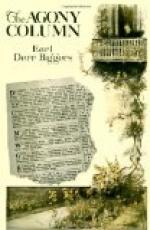“Thank you very much,” said Bray. “I’ll keep this in mind.”
“Have you communicated with my friend at the consulate?” I asked.
“Yes. That’s all. Good morning.”
So I went.
I had been back in my room some twenty minutes when there came a knock on the door, and Colonel Hughes entered. He was a genial man, in the early forties I should say, tanned by some sun not English, and gray at the temples.
“My dear sir,” he said without preamble, “this is a most appalling business!”
“Decidedly,” I answered. “Will you sit down?”
“Thank you.” He sat and gazed frankly into my eyes. “Policemen,” he added meaningly, “are a most suspicious tribe—often without reason. I am sorry you happen to be involved in this affair, for I may say that I fancy you to be exactly what you seem. May I add that, if you should ever need a friend, I am at your service?”
I was touched; I thanked him as best I could. His tone was so sympathetic and before I realized it I was telling him the whole story—of Archie and his letter; of my falling in love with a garden; of the startling discovery that the captain had never heard of his cousin; and of my subsequent unpleasant position. He leaned back in his chair and closed his eyes.
“I suppose,” he said, “that no man ever carries an unsealed letter of introduction without opening it to read just what praises have been lavished upon him. It is human nature—I have done it often. May I make so bold as to inquire—”
“Yes,” said I. “It was unsealed and I did read it. Considering its purpose, it struck me as rather long. There were many warm words for me—words beyond all reason in view of my brief acquaintance with Enwright. I also recall that he mentioned how long he had been in Interlaken, and that he said he expected to reach London about the first of August.”
“The first of August,” repeated the colonel. “That is to-morrow. Now—if you’ll be so kind—just what happened last night?”
Again I ran over the events of that tragic evening—the quarrel; the heavy figure in the hall; the escape by way of the seldom-used gate.
“My boy,” said Colonel Hughes as he rose to go, “the threads of this tragedy stretch far—some of them to India; some to a country I will not name. I may say frankly that I have other and greater interest in the matter than that of the captain’s friend. For the present that is in strict confidence between us; the police are well-meaning, but they sometimes blunder. Did I understand you to say that you have copies of the Mail containing those odd messages?”
“Right here in my desk,” said I. I got them for him.
“I think I shall take them—if I may,” he said. “You will, of course, not mention this little visit of mine. We shall meet again. Good morning.”
And he went away, carrying those papers with their strange signals to Rangoon.




